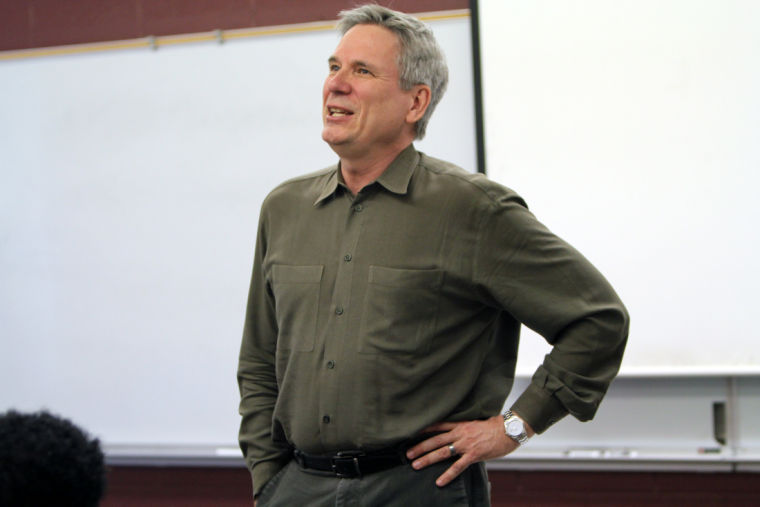TV class changes to reflect technology
Professor Jeffrey Chown talks about director Alfred Hitchcock’s plots Monday in Reavis Hall. Chown has altered his Television Theory class to reflect changing TV consumption habits.
March 31, 2014
Communication professor Jeffrey Chown knows television has changed, and he’s adapted his course to keep up.
Chown teaches Coms 460: Television Theory. In this course, Chown examines the rise of television dramas and the Third Golden Age of Television, which is current television. Chown has incorporated streaming services like Netflix — an increasingly popular way of watching TV — and the shows those services have developed into his lessons.
Chown’s teaching assistant, Ben Tondera, said the pair can offer a lot to their students while keeping them entertained.
“We just kind of engage with them and each other, and we try to have as much fun as we can with them for three hours a week,” Tondera said.
Senior communication major David Reczynski, who is enrolled in Chown’s class, said he has enjoyed the course.
“He’s got lots of knowledge on the subject and he gets the whole class listening to him, interested, and they all want to join in on the discussion,” Reczynski said.
Northern Star: So a big part of your television theory course is about the Third Golden Age of Television, can you tell me a little more about that?
Jeffrey Chown: We’re reading a book about the Third Golden Age of Television. It’s written by Brett Martin, called “Difficult Men.” He looks at new television from the frame of really four important shows, “The Sopranos,” “Mad Men” and “The Wire.” So what we’ve been doing in the class is kind of reading the book and then sort of looking at lot of the episodes, and seeing if the theories Brett Martin has play out in the shows we are seeing.
NS: How are you teaching this course different from previous years?
JC: Television theory used to be that we would talk about network television, and I think that network television has gotten passé, it no longer really matters to people … but the real artistry and the real innovation that is going on in television is going on in cable television, in Netflix, in pay-per-view, and in the multiple ways that young people are receiving television now.
NS: What do you hope the students can get out of this course?
JC: I want students to understand what’s going on in television today, I think a lot of people feel that television is the most important art form … really the sophistication of these shows is way beyond what television used to be, and it’s something much more comparable to what literature always was in our culture.
NS: With quantity of these shows increasing, what happens to the quality of television?
JC: I think there’s been an astonishing improvement in the quality of television. The shows of the 1980s which seemed so good like “Law & Order” or “Hill Street Blues” just don’t come close to the freedom, the complexity, and the sophistication to shows like “The Wire,” “Mad Men,” and “Breaking Bad.” The new distribution forms I think have given artists a lot more freedom in terms of exploring interesting things that keep us watching television.







